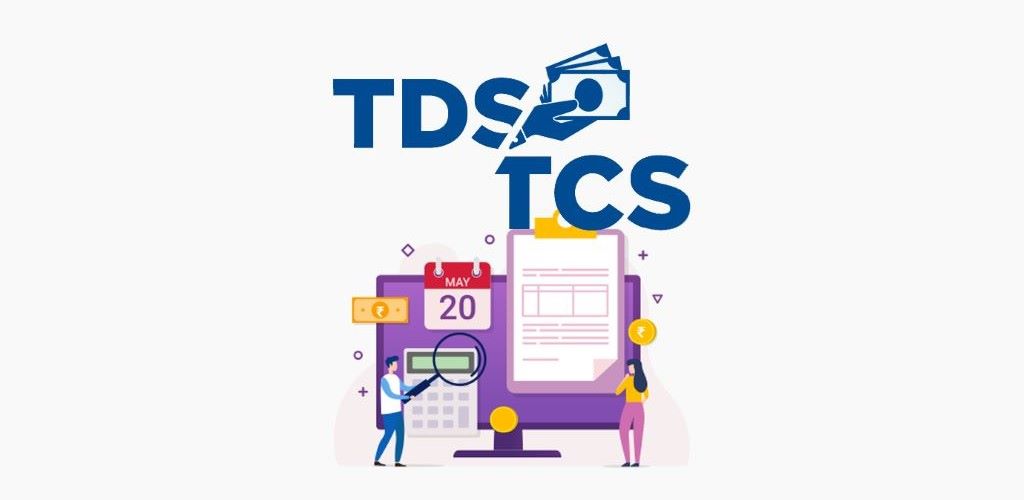TDS (Tax Deducted at Source) and TCS (Tax Collected at Source) are two important taxes in India. TDS is the tax deducted when income is earned, while TCS is the tax collected when a sale is made. These taxes are governed by different sections of the Income Tax Act.
For example, employers deduct TDS from salaries before paying employees. The deducted amount is then remitted to the government on behalf of the income earner. In the case of TCS, when selling certain goods like scrap, the seller collects TCS from the buyer and then deposits it with the government.
Many people mistakenly think TDS and TCS are the same, but they have distinct differences. These differences include who deducts or collects the tax when it is done and to whom it applies.
In this post, we’ll explain what TDS and TCS are and outline their key differences.
What is Tax Deducted at Source (TDS)?
To put it simply, TDS, or Tax Deducted at Source, is a way for the government to collect tax directly from your income as soon as you earn it. The amount of tax deducted depends on the percentage set by the Income Tax Act. If you receive payment for goods or services that is above a certain limit, the payer (whether an individual or a company) must deduct TDS before giving you the money.
Each year, the government decides the TDS rates and the minimum payment amounts for different types of income. Some common types of income where TDS is deducted include:
- Royalty Payments
- Legal Fees
- Technical Service Fee
- Rent Payments
- Consulting Fees
In short, TDS ensures that tax is collected at the source of income, which makes it easier for the government to collect taxes efficiently.
What are the Advantages of TDS?
Here is a list of the potential advantages of TDS are;
- Makes it Hassle-Free for the Taxpayer
One of the biggest benefits of TDS is that the tax is automatically deducted from the taxpayer’s income. This reduces the burden of calculating and paying taxes manually. It simplifies the process of filing Income Tax Returns (ITR), which makes it easier and more convenient for taxpayers.
- Facilitate Transparency
TDS helps maintain transparency in the tax system. Taxpayers can be confident that their taxes are being correctly deducted and recorded. This reduces the chances of errors or fraud and ensures that the government can accurately track and manage tax collections.
- Provide Stable Income
Another major advantage of TDS is that it provides a steady and reliable stream of income for the government. This consistent revenue helps fund essential services and infrastructure, such as electricity, water, technology upgrades, public transport, defence, and security.
- Minimize Tax Evasion
Since TDS is deducted at the source, it minimizes the opportunity for tax evasion. The government can keep a close watch on tax collections and ensure compliance. This helps in maintaining a fair and effective tax system.
- Efficient Tax Collection
Last but not least, TDS makes tax collection more efficient. When the tax is deducted at the source, it reduces the workload for both the government and taxpayers. This streamlined process ensures timely tax collection, which ultimately reduces the administrative burden on tax authorities.
What is Tax Collected at Source (TCS)?
Tax Collected at Source (TCS) is a method where the seller collects a certain percentage of tax from the buyer at the time of sale. This tax is added to the total invoice value of the goods or services. After collecting TCS, the seller deposits it with the government. TCS is commonly applied to specific goods and services, including:
- Alcohol
- Motor vehicles worth more than Rs. 10 lakh
- Toll plaza, quarry, mine, and parking lot services
- Metals like iron ore, lignite, and coal
- Tendu leaves
- Forest produce (excluding tendu leaves and timber)
What are the Advantages of TCS?
Listed below are the major advantages of TCS:;
- Early Collection of Government Revenue
One of the key benefits of TCS is that it ensures that tax revenue is collected earlier in the transaction process, which provides the government with funds sooner. This early collection helps in the timely development and funding of various national projects and services.
- Reduction in Tax Evasion
Another key benefit is that TCS helps identify potential tax evaders by tracking transactions and collecting tax at the point of sale. This reduces opportunities for tax evasion and ensures better compliance with tax laws.
- Ensures Compliance with Tax Laws
The major benefit of TCS is that it has made it mandatory for businesses to collect and deposit tax with the government, ensuring that businesses follow tax regulations. This automatic compliance reduces the risk of penalties for non-compliance.
- Simplifies Tax Payments for Taxpayers
With TCS, taxpayers don’t need to make multiple tax payments throughout the year. The tax is collected at the time of transaction, which makes it more convenient for taxpayers to manage their tax obligations.
- Reduces Compliance Burden for Taxpayers
Since TCS involves collecting tax at the source, taxpayers are relieved from the hassle of filing multiple returns throughout the year. This reduction in paperwork and compliance requirements makes the tax process simpler.
Key Differences Between TDS & TCS
Let’s take a look at the key differences between TDS & TCS.
| Parameters | TDS | TCS |
| Applicability | TDS applies to a wide range of payments made to individuals or entities. TCS, in contrast, is primarily applicable to the sale of specific goods and services. It involves the seller collecting tax from the buyer at the time of the transaction. | TCS, in contrast, is primarily applicable to the sale of specific goods and services. It involves the seller collecting tax from the buyer at the time of the transaction. |
| Point of Deduction/Collection | In the case of TDS, the person making the payment (payer) is responsible for deducting tax. | TCS involves the seller collecting tax from the buyer at the time of sale of goods or services. |
| Nature of Transaction | TDS deals directly with income tax liabilities | TCS is associated with indirect taxes rather than income tax. |
| Limits | TDS is applicable when goods purchases exceed Rs. 50 lakhs annually, as per Section 194Q of the Income Tax Act. | According to Section 206C (1H) of the Income Tax Act, TCS applies to the sale of goods if the sale amount exceeds Rs. 50 lakhs in a financial year. |
| Due Date for Payment to the Government | The due date for depositing TDS with the government is the 7th of every month following the month in which the deduction is made. | According to regulations, TCS must be collected during the month in which the supply of goods or services is made. The seller is required to deposit the TCS amount with the government within ten days from the end of the month in which the supply occurred. |
| Transactions Covered | TDS applies to various types of payments, including rent, commission, interest, salaries, and brokerage fees. | TCS applies to the sale of specific goods and services such as toll tickets, forest products, cars, tendu leaves, minerals, liquor, timber, and scrap. |
| Person Responsible | The responsibility for deducting TDS lies with the individual or company making the payment to the payee. | The responsibility for collecting TCS rests with the individual or business selling the goods or services covered under TCS provisions |
What Could be the Consequences of Failing to Deposit TDS or TCS?
Here is a list of the consequences of failing to deposit TDS & TCS in India.
- Penalties
One of the major consequences of not depositing TDS or TCS on time is the imposing of penalties under the Income Tax Act of 1961. Late TDS deposits can attract penalties ranging from 1.5% to 1.0% per month, while late TCS deposits incur a penalty of 1% per month.
- Interest
Another major consequence is that, in addition to penalties, the government may charge interest on late deposits of TDS and TCS. The interest rate is typically 1.5% per month or part of the month for both.
- Compliance Burden
There is no denying that delayed deposits increase the compliance burden, as taxpayers may need to revise their TDS/TCS returns and rectify any errors in the original filings.
- Negative Credit Rating
Another major consequence is that it can significantly lower a taxpayer’s credit rating. This can make it difficult for businesses to obtain loans and credit from banks and financial institutions.
- Legal Complications
Lastly, not considering depositing can lead to legal action under the Income Tax Act of 1961. This may result in prosecution, potentially leading to imprisonment for a period ranging from three to seven years and substantial financial penalties.
Frequently Asked Questions
Listed below are the frequently asked questions related to the difference between TDS & TCS.
TDS is paid by the payer or deductor when making specified payments. TCS is collected by the seller or collector from the buyer at the time of sale. Both parties have distinct roles in these tax collection processes.
TDS is refundable if the deducted amount exceeds the payee’s actual tax liability and they request a refund. TCS, however, is not refundable because it is collected at the point of sale and remitted to the government on behalf of the buyer.
Typically, a TDS refund takes around 3 to 6 months to reflect in your bank account. The exact time may vary depending on whether you have completed the e-verification process.
If you don’t deposit or collect tax, you can face severe legal consequences, including interest, penalties, and imprisonment. This may involve imprisonment for a period ranging from 3 to 7 years and fines up to Rs. 1,00,000.








